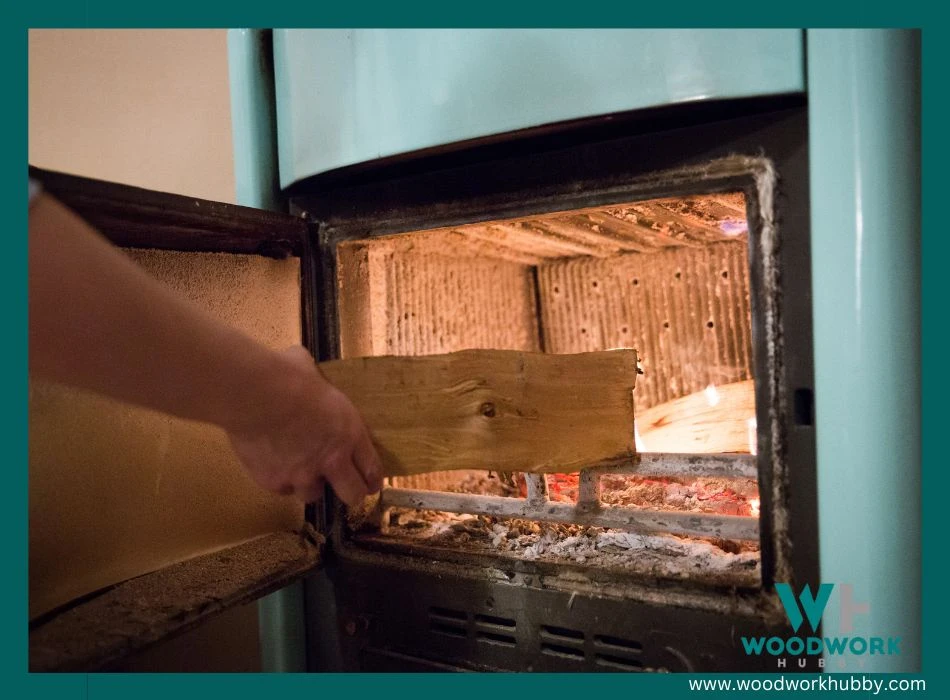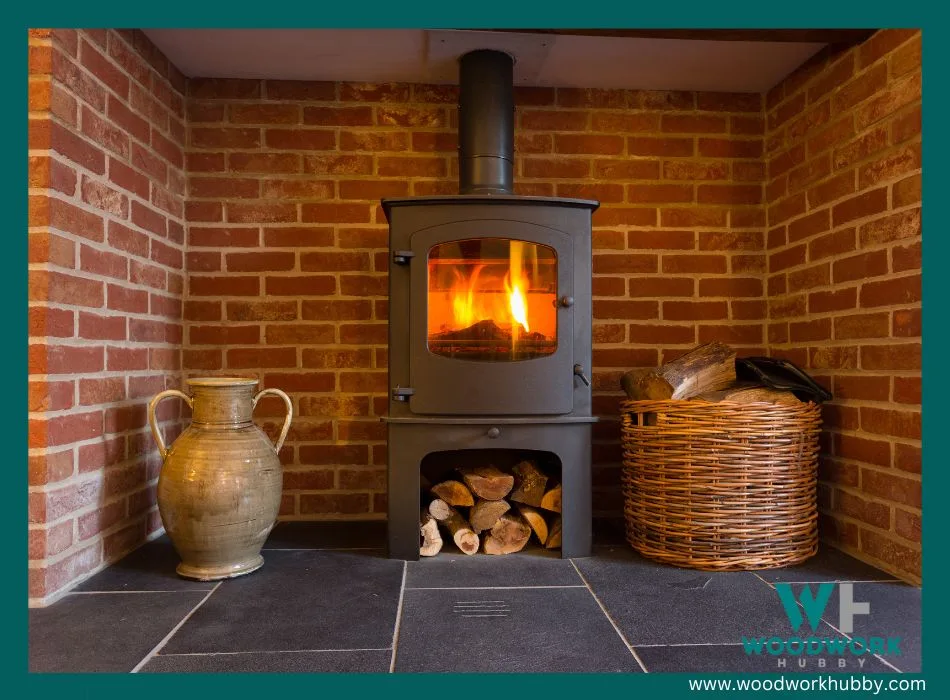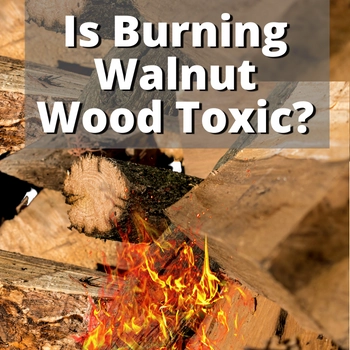Walnut trees are deciduous trees that are native to North America. It has a long history of being used for woodworking and is a popular choice for furniture, cabinets, and flooring. Walnut is also a popular choice for firewood because it burns hot and is easy to split. But you may wonder, is burning walnut wood toxic?
Burning walnut wood is not toxic despite some allergy concerns. In fact, it is safe for you and your family. It produces juglone that is toxic to other plants but not to humans or animals. So, walnut is excellent if you want a safe and sustainable wood to burn.
In this blog post, I will share some of the benefits of burning walnut. I will also discuss the dangers of burning walnut and how to avoid them.
Is Walnut Toxic to Burn?
Walnut is not toxic to burn. However, because the walnut tree produces juglone, many people are skeptical about the safety of burning walnut wood. When this toxin comes into contact with children, animals, or plants, it can be harmful.

The wood shavings of walnut wood are also toxic, so you need to be careful when children or plants are around a fire. Juglone loses its toxicity when it comes into contact with air, water, or bacteria. This makes it safe to burn because the toxin is not carried in the smoke.
When burning walnut wood, you need to be aware of the potential for toxins. You should only burn walnut in a well-ventilated area and make sure that children and animals are not near the fire. You can consult your doctor or a certified arborist if you have any concerns.
Is Walnut Wood Toxic to Humans?
Now that you know the potential dangers of burning walnut wood, you may wonder if it is toxic to humans. The answer is no; walnuts are not toxic to humans. However, as I mentioned earlier, the smoke from a walnut fire can be harmful if inhaled for extended periods of time. This is why it is important only to burn walnuts in a well-ventilated area.
The video shows burning black walnut
Actually, there are many benefits to burning walnuts. Walnut is a renewable resource, a clean-burning fuel, and has a pleasant aroma. Just be sure to take the necessary precautions to avoid the potential dangers of burning walnuts.
Is It Safe to Burn Walnut in a Fireplace?
Walnut wood is a great fuel because of its medium density and ease of burning. It’s high-quality firewood that burns cleanly, ignites quickly, and smells good. Although it is not as high as other hardwoods like oak, the BTU value is far better than softwoods like pine or fir.
Below is a table comparing the BTU value of walnut against the other popular hardwoods and softwoods.
| Wood | Heat per code (Million BTUs) |
|---|---|
| Walnut | 26.2 |
| Oak | 24 |
| Pine | 21.1 |
| Fir | 14.6 |
As you can see, walnut is in the middle of the pack regarding density. It is not as dense as oak but is still denser than most other woods like pine. This means that it will take longer to ignite but will burn for a longer period of time.
What is BTU?
BTU is short for British Thermal Unit. It is a unit of measurement used to determine a fuel’s heat output. The higher the BTU, the more heat the fuel will produce.
Tips for Burning Walnut Safely in a Fireplace
The most important tip is only to burn walnut in a well-ventilated area. This is to prevent the smoke from accumulating and causing health problems.

Other tips include:
Avoid Breathing in the Smoke
Evidently, it is not the wood itself that is toxic to humans. However, the smoke from burning walnuts can be harmful if inhaled for an extended period of time. This is why it is essential only to burn walnuts in a well-ventilated area.
Keep Children and Animals Away
The smoke from a walnut fire can also be harmful to children and animals. This is why keeping them away from the area where you are burning walnuts is important.
Consult a Doctor or Certified Arborist
It is always best to consult a doctor or certified arborist if you have any concerns about burning walnuts. They will be able to advise you on the best course of action.
Keep the Fireplace Clean
The accumulation of soot and creosote in the fireplace is a common problem. Not only is it unsightly, but it can also be dangerous. Soot and creosote are highly combustible and can cause a chimney fire if not removed regularly.
Fire Extinguisher
Be sure to have a fire extinguisher on hand in case of an emergency. A fire may start suddenly and spread quickly, so it is always best to be prepared.
Is Black Walnut Safe to Burn in a Fireplace?
Black walnut is just as safe to burn in a fireplace as any other type of walnut. However, you should take care when burning any type of wood in your fireplace. Always use a screen to catch any sparks that may fly out, and never leave your fire unattended.
Black walnut is a beautiful hardwood with a rich, dark color. It is also one of the most popular woods used in furniture and cabinets.
Video discussing black walnut as a firewood
Although many hardwoods have excellent burn durations, black walnuts are particularly popular because of how widely distributed they are in North America. This also makes them more accessible and reasonably priced.
If you are a fan of using wooden cutting boards in your kitchen, you may be wondering, is walnut wood food safe? Check out my detailed findings!
Can You Burn Walnut Wood?
Yes, you can burn walnut wood. Walnut has a BTU value of 26 million, making it a great fuel for your fireplace. It has a pleasant smell and burns cleanly. Just be sure to use a screen to catch any sparks that may fly out, and never leave your fire unattended.
Precautions To Take When Burning Walnut Wood
You need to take the following precautions when burning walnut wood:
Use a Screen
An unattended fire has burned down many a house. If you are going to burn walnut wood in your fireplace, make sure to use a screen. This will catch any sparks that may fly out and prevent them from igniting anything else in the room.
Never Leave Your Fire Unattended
This is probably the most important precaution to take when burning any type of wood in your fireplace. Fires can get out of control quickly, and an unattended fire is the leading cause of house fires. If you have to leave the room for any reason, make sure to put out the fire first.
Burn in a Well-Ventilated Area
The smoke from a walnut fire can be harmful if inhaled for extended periods of time. This is why it is important only to burn walnuts in a well-ventilated area.
Is Burning Walnut Toxic to Pets?
The toxic juglone in black walnut harms dogs, cats, and horses. However, it is important to note that juglone is broken down by heat, so the smoke from a walnut fire is not toxic to pets. Animals, just like humans, can be affected when they inhale smoke from any type of fire. If you have pets, keeping them away from the area where you are burning walnut wood is best.
Precautions To Take When Burning Walnut Next to Your Pet
If you are burning walnut next to your pet, there are a few things you need to keep in mind.
Ventilation
As mentioned earlier, the smoke from a walnut fire can be harmful if inhaled for extended periods of time. This is why it is important to have good ventilation when burning walnuts next to your pet.
Keep an Eye on Your Pet
You should also keep an eye on your pet while you are burning walnut next to them. If they start to act strangely or have trouble breathing, it is best to move them to a different room.
Put Out the Fire
After you are done cooking, make sure to put out the fire completely. If you leave even a small ember burning, it could start a fire that could quickly get out of control.
How Long Does It Take for Black Walnut Wood to Season?
Generally, it takes black walnut firewood one to two years to season thoroughly. Black walnut can take longer to burn than other seasoned firewood logs, which are often ready to burn in only a few months.
As long as the wood is no more than 1 inch thick, air drying will take between 6 and 24 months. This is because the wood cells have a higher moisture content than normal hardwoods, necessitating a slow and gradual seasoning process.
If the wood is cut into thicker pieces, it will take 1 to 2 years to season. This is because the thick cuts of wood have a lower surface-to-volume ratio. This means there is less exposed surface area for the water to evaporate.
Should You Burn Green Black Walnut?
You should not burn green black walnut because it is difficult to ignite and produces a lot of smoke. The high moisture content in the wood cells makes it hard to get the fire going. Once you do get the fire going, the water in the wood will cause it to produce a lot of smoke.
The best time to cut black walnut is in the fall after the leaves have fallen off the tree. This is because the tree is no longer transpiring water, and the wood cells are at their driest.
If you must burn green black walnut, it is best to dry it first. You can do this by stacking it in a single layer in a shady, well-ventilated area. Allow the wood to dry for at least six months before burning it.
Can You Burn Black Walnut in a Wood Stove?
Yes, you can burn black walnut in a wood stove as long as the wood is properly seasoned. Seasoned black walnut is easy to ignite and produces little smoke and emissions. The high BTU value of the wood also makes it a good choice for heating your home.

If you are going to burn black walnut on a wood stove, it is best to use dry, seasoned wood. Wet or green black walnut is difficult to ignite and produces a lot of smoke.
The best way to season black walnut is to cut it into thin pieces and stack it in a single layer in a shady, well-ventilated area. Allow the wood to dry for at least six months before burning it.
Is Burning Walnut Toxic? | FAQs
Is burning black walnut wood toxic?
No, burning black walnut is not toxic. The wood is high-density and has a low moisture content. This makes it a clean-burning wood that produces little smoke and emissions.

Are walnut shells good for burning?
Walnut shells can be used as fuel for burning. They are high in BTUs and produce a lot of heat. They are totally natural products that do not need to be processed in any way.
How can I treat walnut burns?
If you have a walnut burn, it is best to treat it with a cool, damp cloth. You can also use aloe vera gel or hydrocortisone cream to soothe the skin. If the burn is severe, you should seek medical attention.
What is the best way to season black walnut?
The best way to season black walnuts is to cut them into thin pieces and stack them in a single layer in a shady, well-ventilated area. Allow the wood to dry for at least six months before burning it. This will help ensure that the wood is dried and seasoned properly.
Is Burning Walnut Toxic? | Final Thoughts
Burning walnuts is not toxic. The wood is high-density and has a low moisture content. This makes it a clean-burning wood that produces little smoke and emissions. However, you should only burn seasoned black walnuts to get the best results.
I hope this article has helped you to understand more about burning black walnut. If you have any further questions, please feel free to contact me. Thanks for reading.




